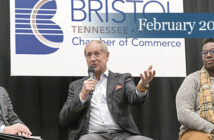By Scott Robertson
The Washington County Economic Development Council Board voted unanimously May 19 to approve the recommended organizational structure for an economic development partnership with Carter and Unicoi counties.
The WCEDC has been working for several months with public and private sector representatives from both counties as well as a private consulting firm, Convergent Nonprofit Solutions, to bring the counties’ economic development efforts together in a single, synergistic organization. WCEDC Board Chairman Tommy Burleson referred to the process as, “this journey toward regionalism.”
Wayne Burns of Convergent explained the basics of the proposed new organizational structure to the board at its May meeting. “This is the ideal design for a public-private partnership,” Burns said, noting the private sector’s stated desire to have a greater role in the funding and management of the partnership. “This is really the cleanest and best way to move the entire regional plan forward.”
The partnership itself would be organized as a 501(c)(6) nonprofit organization, with a separate 501(c)(3) foundation. By statute, each county must maintain what the IRS refers to as an “1101 organization” to oversee its own economic development. Under the plan approved Thursday, each of the three county 1101s would continue to exist, but would be maintained under the 501(c)(6) umbrella.
Why regionalism?
Burns told the council the mandate for bringing the three counties together came from its own members. Convergent interviewed 60 business and government leaders before making its recommendations. “Everybody we spoke to, either in a moderate way or in an extreme way, was for regionalism,” Burns said. “In fact, it was at about 98 percent for regionalism – looking at pulling together Carter, Unicoi and Washington counties. That kind of result is hard to not move forward with.”
That enthusiasm for a regional approach to economic development is driven from the desire to grow jobs and investment, Burns said. “Site selectors who represent companies that might want to move here, or even companies that want to think about expanding here, look at MSA* data.
“Right now that data is not easy for them to view, not easy for them to understand, because there are three individual counties with three individual county governments and there’s not a single over-arching economic development organization umbrella.”
From that perspective alone, Burns said, “in order to be competitive with the other neighboring cities and states, it is very important you go regional.”
Details, details
After consulting with lawyers and accountants in Tennessee, Convergent recommended the creation of the new 501(c)(6) for the three-county region. The concurrent creation of the 501(c)(3) foundation would be, Burns said, “the ideal repository for funding for workforce and education and will be a great place should someone want to donate buildings or land.”
Steve Darden of the law firm of Hunter Smith and Davis told the council, “The structure here satisfies a couple of different things. No.1, it complies with state law, which says in each county there shall be an 1101 organization. Those organizations are supposed to be communication vehicles that involve all the political and municipal subdivisions of the county. For example, in Washington County, the 1101 has to include Jonesborough, Washington County and Johnson City. So all the counties need to retain their 1101s. The partnership itself, however, does not have to be an 1101 designated organization.”
The specifics of the partnership’s governance and leadership structure must still be determined, though it is expected the council’s CEO and staff will become the staff for the new partnership, while maintaining their duties in Washington County’s 1101 organization. Darden said it’s expected each of the three 1101s will have a seat on the board of the 501(c)(6) partnership. “That makes sense, given the 1101s’ statutory role as communication vehicles,” Darden said. “The 501(c)(6) would be where the economic development activity on a regional basis takes place.”
The End Game
Pete Peterson, city manager of Johnson City, took the regionalism discussion one step further. He noted that the WCEDC was born from an effort to marry economic development efforts in Johnson City, Jonesborough and Washington County in the past, and that the EDC is at present working to marry economic efforts between three counties. Peterson said he believes the next three entities to be brought together should be the new partnership, Sullivan County and Greene County.
“Sullivan County has got to be at the table,” Peterson said. “Carter County, Unicoi County and Washington County are in one MSA. If I am here or I am in Timbuktu, I can go to census data and learn all about it I want to, but I can’t learn anything about Sullivan County or Greene County unless I get into a different MSA.
“At the end of the day, the three parties being contemplated today have to work together and we can achieve a certain level of success. But if we’re going to compete against the rest of the world, we have got to have Sullivan and Greene counties at the table long-term.
“Greene County is rife with industry. They have all kind of flat land down there, comparatively speaking with what we have. They have the infrastructure in place. Sullivan County has the wealth. They have the existing employers over there that are ready for their supply chains to be grown and developed.
“If the long-term goal here is just to put (Carter, Unicoi and Washington) counties together and not think any further, I think we’re being extraordinarily shortsighted,” Peterson said. “The Northeast Tennessee region is going to have to pull together if we’re ever going to compete against Middle Tennessee. We’ll never compete with them in terms of population and wealth, but we have to amass all the population and wealth in Northeast Tennessee to even begin to play that game.”
Burleson replied, “I agree with you 100 percent, and everybody on the executive committee will agree with you.”
*Washington, Carter and Unicoi counties make up the Johnson City metropolitan statistical area or MSA.







